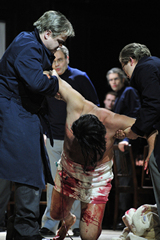| Opera Reviews | 25 April 2024 |
Theater Freiburg's Parsifal comes to East Angliaby Tony Cooper |
|
| Wagner: Parsifal Theater Freiburg Theatre Royal, Norwich 23 July 2014 |
|
|
One of the favourites of the Wagner canon, Parsifal - loosely based on Wolfram von Eschenbach’s 13th-century epic poem Parzival concerning the Arthurian knight Parzival and his quest for the Holy Grail - sums up, I feel, the whole ethos of 19th-century German romanticism. Specifically written for the Bayreuth Festspielhaus it became the composer’s final and farewell work completed in January 1882. Wagner described it not so much as an opera but as a festival play for the consecration of the stage (ein Bühnenweihfestspiel). The opera was first produced at the second Bayreuth Festival in 1882 and the festival had a monopoly on productions of Parsifal until 1903 when the opera was first performed at the Met in New York. The religious and philosophical ideas of the libretto combine a strong mixture of Christianity and Buddhism whilst the symbolism of the cup (which Christ drank from at The Last Supper) and the spear (which pierced his side on the Cross) is still older but the trappings of the poem are, essentially, Christian based. And in this rather bland but gripping production by Frank Hilbrich - responsible for an imaginative and telling production of Freiburg’s Ring cycle a few years ago - the opera harboured some striking symbolism whilst mixing the ancient story with strong undercurrents of contemporary life living under a totalitarian state. Accompanying the transformation music in Act I skilfully edited video footage created by Christian Hilfinger and Valentin Felber blasted the stage against Volker Thiele’s abstract set showing outrageous and indescribable acts of savage brutality to mankind that was chilling to the bone. The set itself comprised a spacious mirrored marble hall bereft of any ornamentation and it fitted the scenario of the opera perfectly as the work is one of bleakness, suffering and compassion set against the all-important message of redemption, the hallmark of Wagner’s late operas. Gabriele Rupprecht’s costumes were an odd mix of contemporary fashions with members of the Brotherhood of the Grail kitted out like an international cricket team on tour attired in dark-coloured polo-neck sweaters and grey-coloured slacks! As an alternative to the holy and serene realm of the Grail, Klingsor’s magical and dark realm was a den of iniquity rife with the practice of black arts and filled with scores of beautiful girls (images of Barbie dolls flashed through my mind) with the enticing Flower Maidens wildly and colourfully dressed from top to toe on hand to seduce any wayward knight coming their way. The portrayal of Parsifal by Roberto Gionfriddo was superbly crafted. He was by no means a fool when it came to his vocal skills harbouring a strong and articulate voice which radiated heavenly throughout the Royal’s large auditorium in a finely-paced performance delivered with confidence and ease while Frank von Hove’s reading of the story-teller Gurnemanz - the wise and veteran knight of the Grail - was second to none. The mezzo-soprano Sigrun Schell also put in a fine and gallant performance as the evil-minded sorceress Kundry. But one had to wait until Act II before she fired up the stage as the unwilling and beautiful seductress under the spell of the revengeful knight Klingsor, sung meticulously by Neal Schwantes. Attired in a striking red dress she projected an angelic and statuesque figure covered in Marian fashion in the traditional light-blue headdress. Freiburg’s French-born music director Fabrice Bollon - a shining star of the pit - brought out all of the colours and texture of the score while the orchestra were alert to his every move. And when he took his bow the audience erupted with wild applause pointing to the fact that the work done in the pit equals to the work done on the stage. The last time Norwich's Theatre Royal engaged itself in staging Wagner was in 1997 when Norwegian State Opera presented the Ring cycle, therefore full-marks to them for performing a minor miracle getting Freiburg Opera safely over the North Sea with a gang of 200 singers, technical staff, etc, which included a well-drilled 50-strong children’s choir who, I should imagine, will remember their great adventure to the capital of East Anglia for many years to come.
|
|
| Text ©
Tony Cooper Photo © Theater Freiburg |

 First presented in Freiburg in April 2013, Parsifal was the first offering of the week in the Theatre Royal, Norwich's short Wagner season, in repertoire with Tannhäuser.
First presented in Freiburg in April 2013, Parsifal was the first offering of the week in the Theatre Royal, Norwich's short Wagner season, in repertoire with Tannhäuser. 





